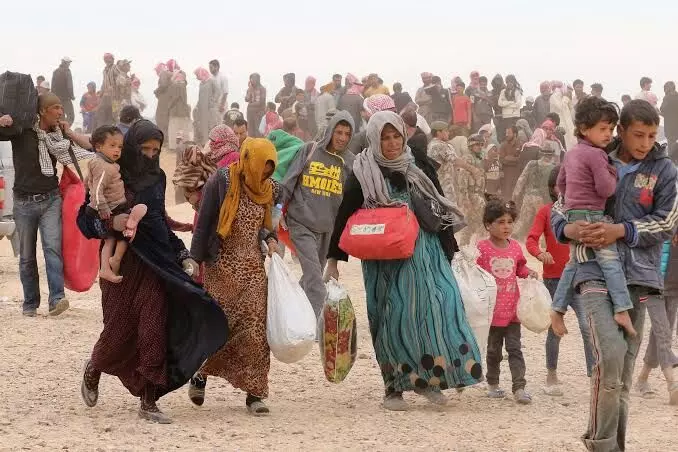World Refugee Day: Why mental health support must be part of refugee care
The United Nations High Commissioner for Refugees (UNHCR) is the global body responsible for safeguarding the rights and welfare of displaced populations
By Anoushka Caroline Williams
File Photo
Hyderabad: Each year, World Refugee Day brings global attention to the rights, resilience and struggles of people forced to flee their homes. While conversations often centre around food, shelter and safety, one dimension remains chronically overlooked: mental health.
From the trauma of war and violence to the stress of displacement and legal uncertainty, refugees carry invisible wounds that rarely receive formal care. In refugee camps and urban settlements around the world—including those in India—millions live in survival mode, unable to access basic psychological support.
What is UNHCR?
The United Nations High Commissioner for Refugees (UNHCR) is the global body responsible for safeguarding the rights and welfare of displaced populations. Founded in 1950, it works in over 130 countries to provide humanitarian aid, legal assistance and long-term solutions for those who have fled conflict, persecution or disaster.
In India—although the country is not a signatory to the 1951 Refugee Convention—UNHCR provides documentation and limited support services to refugees from Afghanistan, Myanmar, Somalia and other countries. These services include referrals to education, healthcare and protection networks, but access to dedicated mental health care remains scarce.
Psychological wounds that don’t heal easily
Clinical psychologist Dr Chaya Venugopal, who has worked with displaced populations in Tamil Nadu and Telangana, points out that ‘refugees are often physically safe by the time they reach a camp or urban shelter, but emotionally, they’re still in danger.’
Speaking to NewsMeter, she notes that symptoms of depression, post-traumatic stress disorder (PTSD), anxiety and insomnia are common across all age groups but often go undiagnosed. “There’s a huge gap between what people are experiencing and what they’re able to name. They’ve seen things no one should see—homes destroyed, family members lost and long, perilous journeys. But there’s often no space or system for them to unpack that pain.”
No clinics, few counsellors
Despite the psychological burden, most refugee camps lack mental health services.
Trained professionals are rare. In urban settlements, support is mostly offered by overburdened NGOs. Funding for long-term psychological care is almost always insufficient.
A 2024 assessment by the International Organisation for Migration (IOM) found that over 70 per cent of refugees in surveyed camps in South Asia reported experiencing symptoms of emotional distress, but fewer than 10 per cent had ever spoken to a trained mental health professional.
Barriers include a lack of awareness, stigma, language and cost. Dr Venugopal adds, “Mental health infrastructure in India is already stretched thin. Refugees are not just excluded from policy—they’re excluded from visibility.”
The role of community-led care
In the absence of formal systems, some local initiatives have stepped in. The Azadi Project in Delhi, for instance, trains refugee women to become community peer counsellors. These women use storytelling, art therapy and listening circles to support fellow survivors.
Sara Hussain, a program facilitator with the initiative, says healing often begins when someone feels heard. “We teach women that it’s okay to feel broken. And we also remind them that healing is possible—even in exile.”
In Tamil Nadu’s Sri Lankan Tamil refugee settlements, churches and schools often host informal support groups. These are run by volunteers trained in psychological first aid.
India’s legal ambiguity leaves gaps
India is not a party to the 1951 UN Refugee Convention or its 1967 Protocol and lacks a national refugee law. As a result, refugees in India live under varying legal conditions based on their origin and documentation status.
Aparna Chatterjee, a refugee rights advocate, believes this lack of legal framework creates systemic neglect. “The absence of legal recognition leads to gaps in everything—from identity cards to healthcare access. Mental health, which is already neglected in mainstream policy, barely exists in the conversation around refugee welfare.”
Moving Forward: From survival to healing
Experts argue that mental health must be treated as essential, on par with shelter, food, or medicine.
Recommendations include training refugee community members in psychological first aid, embedding mental health screening into existing clinics, hiring culturally sensitive interpreters, and developing India-specific refugee wellness guidelines.
World Refugee Day is a reminder that displacement is not only a physical rupture—it is an emotional one. Refugees lose their homes, but also their sense of safety, identity, and belonging. Without proper mental health care, those losses fester silently, often for years.
Until mental health becomes a core component of refugee support systems, the psychological cost of displacement will remain invisible, yet deeply felt.